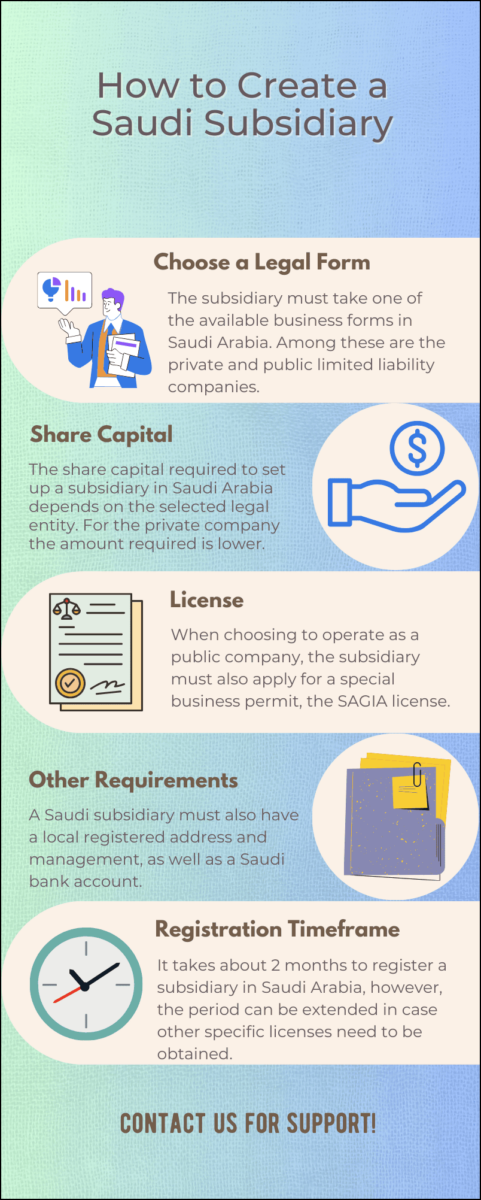When a business buys another one, the second business generally becomes a subsidiary. Therefore, a subsidiary is a business that is owned and controlled by another company. The owning company is named a parent or a holding company. In this article, our company formation agents in Saudi Arabia explain different aspects related to opening a subsidiary in Saudi Arabia. Numerous foreign investors are considering opening a subsidiary in Saudi Arabia in 2024 because, as the largest economy in the Arab area, the country is a major hub for business development and investment into the region.
| Quick Facts | |
|---|---|
| Applicable legislation (home country/foreign country) |
Foreign country |
|
Best used for |
Various types of activities
|
|
Minimum share capital |
– approx. 27,000 USD for private limited liability companies, – approx. 134,000 USD for public companies (additional financial requirements apply for SAGIA licenses for foreign companies) |
| Time frame for the incorporation (approx.) |
Approx. 2 months, however, due to licensing requirments, the time frame can be extended |
| Management (local/foreign) |
Local |
| Legal representative required |
Yes |
| Local bank account |
Yes |
| Independence from the parent company | Independent legal form |
| Liability of the parent company | Parent company is not liable for the subsidiary’s obligations |
| Corporate tax rate | 20% |
| Possibility of hiring local staff | Yes |
We can also offer support in immigration to Saudi Arabia.
How to open a subsidiary in Saudi Arabia in 2023
The New Companies Law took effect on January 19, 2023 (the Effective Date), and the Ministry of Commerce (MoC) officially announced its Implementing Regulations, which went into effect one day earlier on January 18, 2023. The former Companies Law, established in accordance with Royal Decree No. M/3 of November 10, 2015, is replaced with the New Companies Act.
Entities that will be incorporated and enter the KSA market after the effective date must adhere strictly to the New Companies Law’s requirements. All entities, regardless of the grace period, are subject to the continuing requirements that were included in the 2015 Companies Law and mirrored in the New Companies Law.
The incorporation procedure has been simplified for companies that want to open a subsidiary here, even though there still are certain minimum capital requirements.
There is no limit on the foreign ownership of a subsidiary company in Saudi Arabia in 2024, as long as the registration and capital criteria have been respected. Our specialists can help you start a business in Saudi Arabia in the shortest time possible.
Why operate through a subsidiary in Saudi Arabia
Foreign and local enterprises seeking to expand their operations in Saudi Arabia, respectively other regions than the ones they operate in here, can choose between branches and subsidiaries. If for Saudi companies the branch office can ensure the full control over the satellite business and the creation procedure is fairly simple, foreign entities need to consider their options more attentively.
Here are the main features of a Saudi subsidiary and the advantages it could deliver to foreign companies deciding for this business form:
- it can take the form of one of limited liability or joint stock company, thus being treated like a domestic entity;
- it will be a separate and independent business from the parent company and its management will be based in Saudi Arabia where it will decide on behalf of the subsidiary;
- it can complete the same activities of the parent company, as well as other operations, thus ensuring a better adjustment to the local market;
- from a taxation point of view, the subsidiary will pay the corporate income tax and other levies applicable to Saudi companies;
- it can own various types of assets in Saudi Arabia, which makes it the perfect solution for foreign holding companies;
- it must comply with the Company Law applicable in Saudi Arabia, however, it can report to the parent company and implement internal regulations from its country of origin.
Many times, foreign enterprises decide on subsidiaries in Saudi Arabia thanks to the fact that they can adapt their products or services to the local market and have no liabilities in respect to the debts of obligations of their subsidiaries.
The downside of opening a subsidiary compared to a branch in Saudi Arabia is that the former needs to apply for a foreign capital investment license with the General Investment Authority (SAGIA license). The procedure is not complicated, however, it can be long until all the documents are verified and approved.
You can also count on our Saudi accountants for payroll services. This implies not only handing out paychecks, but also completing the paperwork related to employment. As easy as it may seem, this is one of the most strenuous activities of an accounting department in a company. If you want to outsource it, you can use our services.
If you want to open a company in Saudi Arabia or decide on immigration to Saudi Arabia and need support on choosing a legal form, our local agents can guide you.
If you are interested Saudi immigration, many cities are quite welcoming. For example, Jeddah is one of the largest ports. It is also the country’s second-largest city in the nation with 3.5 million residents. Additionally, the city hosts quite an impressive number of international residents from all over the world.
People who want to move to Saudi Arabia can apply for different types of visas, However, not all visas can be used to secure Saudi Iqamas or residence permits. For this purpose, a foreign citizen must comply with various requirements, among which one of the most important is sponsorship.
Requirements to open a subsidiary in Saudi Arabia
A foreign company interested in setting up a subsidiary in Saudi Arabia must consider a few important aspects, among which:
- having a local registered address for the Saudi subsidiary;
- draft Articles of Association for the subsidiary;
- set up a local bank account;
- register with the Tax and Zakat Authority in Saudi Arabia;
- apply for the SAGIA license, plus other business permits depending on the industry it will operate in;
- obtaining a company seal and becoming a member of the Chamber of Commerce are also requirements to be met.
If you need assistance in opening a subsidiary in this country, our Saudi company formation specialists are at your service during the entire creation procedure, while our immigration lawyers in Saudi Arabia can help you move here.
Here is also our infographic on this subject:
Share capital requirements for subsidiary registration in Saudi Arabia
One of the main things to consider when establishing a subsidiary in Saudi Arabia is the minimum share capital imposed by the law. From this point of view, the following should be noted:
- in order to register a subsidiary as a private limited liability company, a foreign enterprise will need at least 100,000 SAR or the equivalent of nearly 27,000 USD;
- in the case of a joint stock company, the minimum amount required rises to 500,000 SAR or approximately 134,000 USD;
- the SAGIA license requires a minimum share capital ranging between 134,000 USD and up to 8 million USD.
Here are the main aspects to consider about the SAGIA license for a Saudi subsidiary:
- for a services license, the minimum amount required is 134,000 USD;
- for an industrial license, the minimum share capital ranges between 267,000 USD and 1,334,000 USD;
- for a trading license, the amount starts 7,2 million USD if a Saudi partner holding at least 25% of the business is brought on board;
- 8 million USD is required if full foreign ownership is sought;
In the case of the trading license, the share capital must be increased to 54 million USD within 2 two years when divided shareholding between a foreign and Saudi company is chosen.
If you want to create a subsidiary and need assistance in understanding the requirements of the SAGIA license, our company registration consultants in Saudi Arabia can help you.
Holding company liability in Saudi Arabia
According to the Companies Law, outside statutory insolvency requirements, the liability of the holding company in Saudi Arabia is limited to the amount of its investment in the subsidiary.
In case, though, the subsidiary losses are bigger than 50% of its paid-in capital, the shareholders have to effectuate the procedure in the Companies Law, or incur the loss of limited liability. Our company registration consultants in Saudi Arabia can further explain this matter.
Tax matters for subsidiaries in Saudi Arabia in 2024
For 2024, parent companies and their entirely owned subsidiaries in Saudi Arabia have to submit their consolidated financial statements, as well as the profits of the subsidiaries, if the subsidiaries are registered in or out of Saudi Arabia.
Investment in businesses outside of the country will be deducted from the zakat (a religious obligation or tax) base if the taxpayer files the financial statements audited by a certified public accountant.
In case the taxpayer does not comply with these requirements, the investment will not be deductible. Our Saudi Arabia company formation advisors can offer further details related to this issue.
With respect to the taxes the subsidiary must pay, the corporate tax rate is levied at a standard rate of 20%. The Zakat, which is calculated based on the net worth of the business is set at 2.5%. Withholding taxes are imposed on various types of incomes at rates ranging between 5% and 20%. Accounting requirements are in place and our team can give you more details.
Economy of Saudi Arabia for 2024
Aljazira Capital projected in its year-end report that Saudi Arabia’s GDP will expand by 4.4% in 2024. Moody’s expected a 4.6 percent increase in 2024, while the Kingdom’s Finance Ministry’s prognosis for the current year is in line with the forecast. The financial brokerage firm stated in the research that government investment, the completion of megaprojects, Vision 2030 initiatives, and increasing private sector participation are projected to drive Saudi Arabia’s economic acceleration. The agency also stresses that improving consumer spending, a declining unemployment rate, and an increase in non-oil private sector activity are indicators of positive economic circumstances on a larger scale.
If you would like to know more about setting up a foreign subsidiary in Saudi Arabia, or for advice on how to open a company in Saudi Arabia, please feel free to speak to our friendly staff. Address our immigration lawyers in Saudi Arabia if you want to relocate here.



